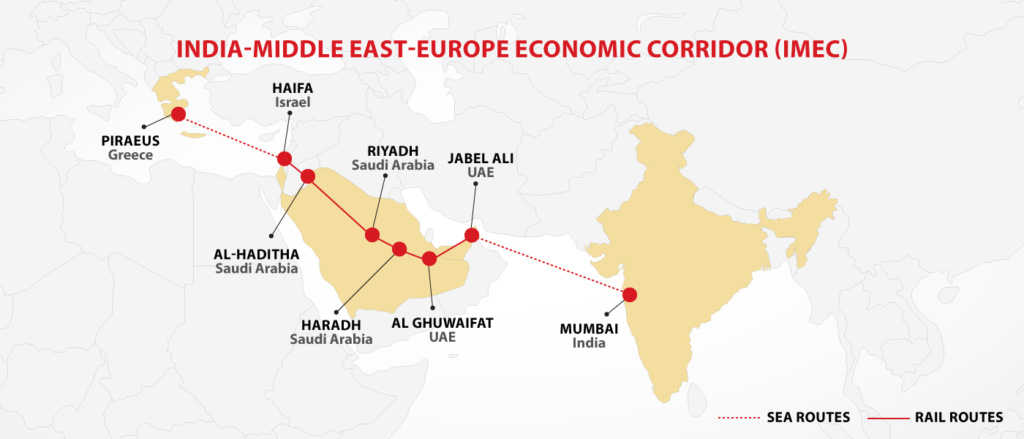France and India Strengthen Ties: IMEC Corridor, Defense Deals, and Geopolitical Shifts
Introduction
French President Emmanuel Macron and Indian Prime Minister Narendra Modi displayed their strategic partnership during a meeting in Marseille, discussing key initiatives like the India-Middle East-Europe Economic Corridor (IMEC) and strengthening defense ties. This collaboration marks a significant shift in global trade and geopolitics, challenging China's Belt and Road Initiative (BRI) while opening new economic opportunities. But who stands to gain, and who might lose in this evolving landscape? Let's dive in.
Key Highlights from the France-India Meeting
1. The IMEC Corridor: A Game-Changer for Global Trade
IMEC is a new maritime and rail transport corridor linking India, the Middle East, and Europe, offering an alternative to China’s Belt and Road Initiative.
- Route: India → UAE → Saudi Arabia → Jordan → Israel → Europe.
- Purpose: Faster trade connectivity, reduced dependence on Chinese supply chains.
- Economic Impact: Expected to boost investment in infrastructure, ports, and logistics.
This corridor is seen as a strategic move to counter China’s dominance in global trade and create new economic alliances.
2. France-India Defense Collaboration: Rafale Jets & Submarines
France and India are strengthening their military and defense ties, including discussions on purchasing additional Rafale fighter jets and submarines.
- India’s Rafale Purchase: Already operating 36 Rafale jets, India is looking to acquire 26 more for its Navy.
- Submarine Deal: India is considering Scorpène-class submarines, enhancing maritime security in the Indian Ocean.
This collaboration boosts India’s military modernization efforts while expanding France’s defense exports.
Who Benefits from IMEC?
✅ India
- Trade Efficiency: Reduces reliance on China for trade routes.
- Economic Boost: Strengthens India’s role as a global trade hub.
- Strategic Influence: Expands India’s presence in the Middle East and Europe.
✅ France
- Stronger EU-India Ties: Strengthens France’s role as India’s leading European partner.
- Defense Exports: Benefits from increased arms sales to India.
- Marseille as a Trade Hub: The city gains economic advantages as a key IMEC entry point in Europe.
✅ Middle Eastern Countries (UAE, Saudi Arabia, Israel, Jordan)
- Logistics & Transport Boom: New trade infrastructure enhances connectivity.
- Economic Diversification: Reduces dependence on oil revenues.
- Strategic Positioning: Becomes a central player in global trade between Asia and Europe.
✅ European Union (EU)
- Trade Diversification: Less reliance on Chinese-dominated routes.
- Stronger Economic Ties with India: Boosts EU-India cooperation in technology and energy sectors.
Who Could Lose from IMEC?
❌ China
- Losing Trade Control: IMEC competes directly with China’s Belt and Road Initiative.
- Economic Retaliation? China may respond with trade restrictions or deepen ties with Middle Eastern partners to counterbalance IMEC.
- Strategic Weakening: India’s rising influence in global trade weakens China’s dominance.
❌ Pakistan
- Bypassed by IMEC: Pakistan is excluded from the corridor, limiting its economic benefits.
- Reduced Trade Leverage: India strengthens its economic connectivity with the world while Pakistan remains isolated.
❌ Russia
- India’s Defense Shift: India’s growing ties with France may reduce its historical dependence on Russian military equipment.
- Energy Trade Shift: India may seek alternative energy sources from the Middle East, affecting Russian oil exports.
Challenges & Risks of IMEC
1. High Infrastructure Costs
- IMEC requires massive investments in rail, ports, and logistics.
- Funding challenges exist due to multiple stakeholders, unlike China’s state-funded BRI.
2. Geopolitical Instability in the Middle East
- The corridor passes through regions with ongoing political tensions (e.g., Saudi-Iran rivalry, Israel-Palestine conflict).
- Any instability could disrupt trade flow and investments.
3. China’s Potential Retaliation
- China could lobby Middle Eastern countries to limit IMEC’s success.
- Beijing may cut economic partnerships or offer more attractive trade deals to weaken the corridor’s impact.
4. Environmental Concerns
- Large-scale infrastructure projects can cause environmental damage.
- IMEC must adopt sustainable development policies to minimize ecological harm.
5. Competition with the Suez Canal
- The Suez Canal remains the primary route for Asia-Europe trade.
- IMEC must prove more cost-effective and time-efficient to attract businesses.
Alternative Perspectives: Will IMEC and BRI Coexist?
While IMEC is designed to counter China’s BRI, some experts believe both can coexist:
- Middle Eastern countries benefit from both: Saudi Arabia, UAE, and Israel are key partners in both projects, maximizing economic gains.
- China may adapt rather than resist: If IMEC proves successful, China may look for collaboration opportunities rather than direct confrontation.
- Global trade is diversifying: The world economy is shifting towards multiple trade corridors rather than reliance on a single route.
Fun Facts: France & India’s Long-Standing Ties
🎭 Did you know? India’s Pondicherry was a French colony until 1954! The town still retains French architecture, cafes, and a French-speaking population.
🛩️ France is India’s #1 European defense supplier, providing fighter jets, submarines, and nuclear technology.
🎨 Bollywood in Paris? Several Indian movies, including 'Befikre', were filmed in France, showcasing the deep cultural exchange.
🚄 India & France are collaborating on high-speed rail projects, with French expertise helping develop India’s railway infrastructure.
Conclusion: A High-Stakes, Long-Term Project
IMEC has the potential to reshape global trade, strengthening India, France, and the EU while reducing China’s dominance. However, challenges like funding, political instability, and competition with existing routes could impact its success.
The coming years will determine whether IMEC becomes a global trade revolution or just another ambitious initiative. Stay tuned for further developments!
📢 What’s Your Take? Do you think IMEC will be a success, or will China counter it effectively? Drop your thoughts in the comments! 🚀


